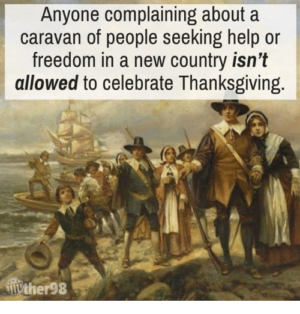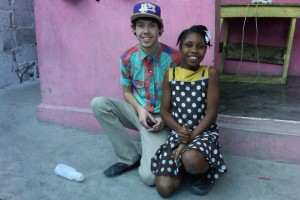The news, once again, is not good. Migrant caravans or asylum-seekers are being tear-gassed at the border. An American Christian was killed when he attempted to evangelize to natives on the island of North Sentinel. A British Ph.D. student was convicted and sentenced to life in prison on espionage charges by the UAE. (Thankfully these charges have been dropped). To top it all off, Thanksgiving was this past week and the whole of America is reminded of how much we have to be thankful for, and how, to the shame of the US, Native Americans were slaughtered and disenfranchised throughout the course of our history.
While I had a rather odd but pleasant Thanksgiving in England doing all but thanksgiving things, I have been puzzled by the news lately. More specifically, I have been confused at the inconsistent way people have been arguing about these news stories. Although I have seen it in the past, I’ve noticed more people are using analogies to prove their point. For example, how could one be against letting in the asylum-seeking caravan when one also celebrates Thanksgiving. Here, the situation of the caravan is analogous to that of the pilgrims. However, analogies tend to work both ways if they are not carefully defined. If pilgrims are the villains of history, the same ones who would go on to trick, cheat, murder, and annihilate many native Americans, then doesn’t this potential villainy also apply to the caravan?
Another example can be found in the death of American missionary, Johnathan Chau. While trying to proselyte the natives of the island of North Sentinel who have extremely limited contact with the outside world, Chau was killed by arrows. Some are considering him a martyr, which may be overstepping some traditional definitions, but others are calling him a genocidal maniac and one who’s white evangelical heritage has sold him the myth of colonial-era missions. The analogy being made here is more subtle and implicit. As a representative of the worst of white colonial mission work (although there is no evidence of this), Chau becomes a conspirator in the legacy of British colonists bent on converting the inhabitants of what would become “New Canaan.” Like the settlers from Europe carrying insidious foreign diseases that would wipe out Native American tribes, Chau becomes the genocidal maniac who would endanger the lives of these Sentinel natives. Chau is analogous to the villainous pilgrims. Yet, the flipside to this implicit analogy is that the natives are the ones who are being ‘invaded’ by a foreigner. Shouldn’t they have let him in?
I think many white evangelicals have underestimated the damaging effect that colonialism/empire has had on the world. I also believe that some effects of colonialism/empire have been overstated in some cases. Not because these concepts don’t affect people, but even in the beginnings of the 21st century, it’s only been 60 years since the end of the decolonization period. (Although, Empires and colonies still exist). We are only beginning to understand how colonialism has affected us and our world. We are at a high historical vantage point with almost four hundred years of history to be able to condemn some of the actions and attitudes of the pilgrims and first settlers. However, we don’t have the same vantage point with the Caravan or Chau.
Let me suggest a better way forward, one that doesn’t contradict itself.
First, stop making bad analogies. History is important. The past can tell us a lot about our present, and even shape our future, but these types of analogies are not the most useful tool for making these points. At best, they make for some soul-shuddering memes that are sure to ruin your next holiday meal. At worst, you end up logically condemning the people you sought to protect.
This brings us to my second suggestion: Be Charitable. I’ve written elsewhere on this forgotten Christian virtue, but let me just recap. Charity is a love that seeks understanding. It’s a disposition that listens, that asks kind and compassionate questions, and one that responds with humility. Being charitable does not mean that you can’t disagree with someone. Being charitable means disagreeing with a person after you have rightfully understood them. These politically and emotionally charged issues such as immigration, refugees, gun violence—these are important conversations. They are important issues to disagree on, to converse and argue about because they deeply matter. Yet, our recent arguments have gotten us nowhere. Why? It’s not due to a lack of passion or information, but a lack of charity. We are talking past each other because we have not stopped trying to understand each other. In doing so, we have stopped loving one another. If we don’t change soon, our partisan and tribal fragmentation may become permanent.





Leave a Reply
Your email is safe with us.